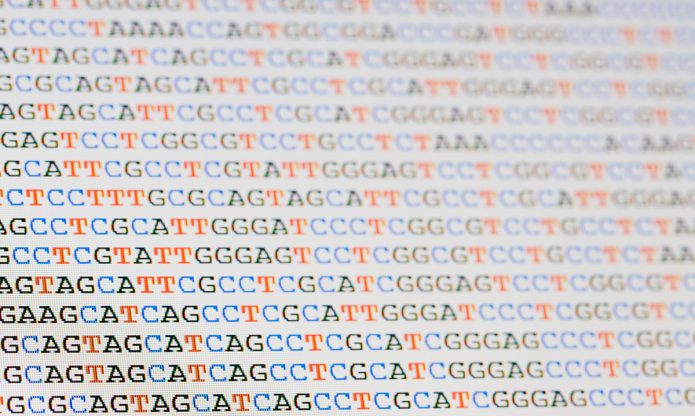Analysis of genetic material is growing strongly. Just a few years ago, researchers were talking about second-generation sequencing as a completely new tool in the field. Now a third generation is already heading to take the pole position.
The challenge of this third-generation sequencing technology is that researchers lack the analytical tools for managing the data generated.
To solve this challenge, the Novo Nordisk Foundation has awarded Shilpa Garg, Associate Professor at the Department of Biology of the University of Copenhagen, a grant of DKK 10 million under its ambitious Data Science Investigator Programme.
The 5-year grant will enable Shilpa Garg to develop computer-based tools that can analyse enormous and extremely complex data sets to extract meaningful information from them.
“This research project aims to develop methods for extracting information from the latest and most advanced sequencing techniques and to discover variation in complex sequences of the genetic material that cannot be analysed with traditional methods. Advanced technologies and sophisticated algorithms have the potential to create a further detailed mapping of the human reference genome so that we can go from analysing one chromosome in each cell to examining both copies of each chromosome. This is important in clinical health research and diagnostics,” explains Shilpa Garg.
Taking the next step in sequencing DNA
Third-generation sequencing technologies can do what no previous technology could achieve: they can map large areas of genetic material comprising the repeating sequences of the building blocks of DNA.
Previous technologies have been limited by only analysing small sequences of genetic material and being inadequate for the long sequences of repetitions. This is like assembling a puzzle with identical pieces. This has created difficulty for researchers in mapping the sequences of repetitions and how these affect health and disease.
“Now that we can read these long sequences of the genome, we need the tools to analyse them together with the strands of genetic material. The analytical tool I want to develop must be accessible to researchers all over the world, be open source and be easy to use,” says Shilpa Garg.
Shilpa Garg elaborates that insight into these still-unknown regions of the genome may have major clinical significance.
“Analysing these sequences in the genome means that we can also find mutations that cause disease and thereby determine how to target these mutations with drugs. This will be a big step in understanding why various diseases develop and how to make personalised medicine for individual treatment,” explains Shilpa Garg.
Testing the new methods clinically
Shilpa Garg says that the grant from the Foundation is very important for her to establish her research group and develop tools that can help the entire scientific spectrum within her field.
However, this ambitious researcher also has her eyes set on larger goals, including eventually seeking additional funding, so that she has the opportunity not only to develop the analytical tools but also to test them clinically.
“I am excited to be able to work with both the Danish National Genome Center and the Human Pangenome Reference Consortium to develop and test the methods so that they can advance research in genetic analysis,” concludes Shilpa Garg.
Grants to seven researchers
The grant to Shilpa Garg is one of seven new grants totalling DKK 62 million recently awarded by the Foundation through its Data Science Investigator Programme.
The grants are divided into the categories of Emerging Investigator, Ascending Investigator and Distinguished Investigator. The grants target research leaders at different career stages to support attractive career paths for talented specialists within data science.
The seven grant recipients
Emerging Investigator
- Shilpa Garg, Assistant Professor, Department of Biology, University of Copenhagen: Efficient, High-resolution Approaches for Integrative Sequencing Analysis of Complex Diseases – DKK 9,960,709
- Signe Marie Jensen, Assistant Professor, Department of Plant and Environmental Sciences, University of Copenhagen: Enhancing Statistical Methodology for Toxicophenomics: High-throughput and High-dimensional Data for Ecotoxicological Risk Assessment – DKK 9,225,108
- Jesper Madsen, Assistant Professor, Department of Mathematics and Computer Science, University of Southern Denmark, Odense: Islet Cartography – Multilayered Mapping of Islets of Langerhans in Health and Disease – DKK 8,790,602
- Niklas Pfister, Assistant Professor, Department of Mathematical Sciences, University of Copenhagen: CausalBiome: Developing a Unified Statistical Framework for Analysing Microbiome Data – DKK 9,812,255
Ascending Investigator
- Søren Besenbacher, Associate Professor, Department of Clinical Medicine, Aarhus University: Novel Methods to Model Mutational Processes in Germline and Cancer – DKK 6,705,000
- Morten Arendt Rasmussen, Associate Professor, Department of Food Science, University of Copenhagen: First Principal Models, Neural Networks and Functional Graphical Models for Defining Metabolic Capacity as a Tool for Personalized Nutrition (FOODTOP) – DKK 9,267,806
Distinguished Investigator
- Rasmus Pagh, Professor, Department of Computer Science, University of Copenhagen: Providentia: Privacy-driven Trust in Algorithms – DKK 8,410,068
This is the second time the Foundation has awarded grants through the Data Science Investigator Programme, which is part of the Foundation’s Data Science Initiative.
The Initiative was launched in 2019 and aims to broadly boost capacity within data science, including supporting the implementation of ambitious research programmes, establishing new national infrastructure, offering attractive career paths and educating and training more data science specialists. The Foundation has distributed nearly DKK 600 million through the Initiative. Read more here.
Further information
Christian Mostrup, Senior Programme Lead, Communications, Novo Nordisk Foundation, +45 3067 4805, [email protected]








